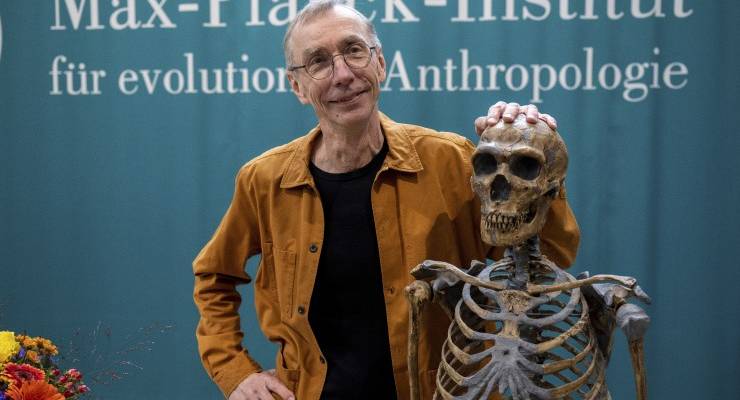
The Nobel prize in physiology or medicine has been awarded to Swedish geneticist Svante Pääbo for his discoveries of how humans dead and gone (formally referred to as “extinct hominins”) live on in humans alive and here.
The Nobel prize body praised Pääbo for his “seemingly impossible” accomplishment of sequencing the genome of the (now extinct) Neanderthal and his “sensational discovery” of a different hominin, the Denisova. Neanderthals lived west, Denisovans inhabited east, but Pääbo found both had time to transfer their genes with Homo sapiens.
“This ancient flow of genes to present-day humans has physiological relevance today,” they wrote.
Pääbo’s team at the Max Planck Institute for Evolutionary Anthropology determined that most modern humans come with a small serve of Neanderthal, but just how much comes down to geography. The gene is most common in Central and South American populations.
So what exactly can a dose of Neanderthal DNA get you?
Immunity (or lack thereof)
Humans with the gene are more susceptible to certain infections, including the ill-fated COVID-19. Pääbo was clear that (unfortunately) we cannot “blame” Neanderthals for COVID, but the surplus of deaths does come down to their DNA.
“It is quite substantial, it’s more than 1 million extra individuals who have died due to this Neanderthal variant that they carry,” he said in a lecture earlier this year.
He also found that a Neanderthal-carrying novel coronavirus patient was “three times more likely to need artificial ventilation” than a neighbour with none of the hominin’s DNA.
The gene pool may not be favourable to COVID-19, but for other illnesses it bolstered immunity.
Rising above the pack
The high-altitude gene that allows Tibetans to breathe easy where others can’t is due to the Denisovas. While other mountain-dwellers have adapted to the thin air by adding more oxygen-carrying haemoglobin to their blood, Tibetans carry less. The gene allows them to use smaller quantities with much more efficiency.
Body and mind
Those with the Neanderthal gene are more sensitive to pain. Genetic variants in the sodium channel which initiate pain signals mean those who carry the gene will experience more pain. It’s also reported to play its part in mood swings, sleeping patterns and smoking status.
Miscarriages
There’s a genetic advantage in the Neanderthal gene for women who want to have a lot of kids. They were able to produce more progesterone receptors in their cells, which ultimately protected them against miscarriage and bleeding during pregnancy.
A weaker immune system but stronger on top of a mountain, Pääbo has explored the basis for exploring what makes us uniquely human. With so many differences in such a small genetic code, he has said he wonders just how much more of an influence Neanderthals could have had on humanity had they survived another 40,000 years.








Fascinating story. But beware the dangling modifier that makes nonsense of this sentence: ‘A weaker immune system but stronger on top of a mountain, Pääbo has explored the basis for exploring what makes us uniquely human.’ You are making Paabo the subject of the sentence and saying that it’s Paabo who has a weaker immune system but is stronger on top of a mountain. Subbies should pick this up … does Crikey have subbies?
Dangling modifiers are occuring with same frequency as using him/her instead of he/she at the start of a (usually spoken) sentence. ‘Her and me doing things’ sigh.
Even worse is when the second-guessing occurs: “doing things to her and i”
More common now would be “Me & her…”.
Any Stats. on LNP Pollies Neanderthal % ?
What on earth is that supposed to mean? How is COVID-19 ill-fated? It actually seems to be flourishing, developing in all sorts of ways and in general doing very well for itself.
I wondered whether “…humans dead and gone (formally referred to as “extinct hominins”)” was meant to read ‘formerly‘ but am unsure of the Neanderthal’s preferred code of etiquette.
I don’t think so. But I do think there would have been more than one Neanderthal to be consulted.
…ping
Yes, it’s the humans who get COVID that are ill-fated.
It took awhile, the Neanderthal genome was mapped a few years ago.
Nobel Prize Committee always seems late to the party. So much good science to recognise, only one opportunity a year to recognise it.
What I find most intriguing is that the Neanderthal genes were, until very recently, entirely absent from west Africans though the rest of the continent’s inhabitants had a similar quotient, 2-4%+, as the rest of humanity.
See Rebecca Wragg Sykes’ “Kindred: Neanderthal Life, Love, Death and Art”